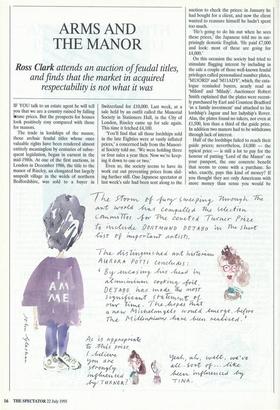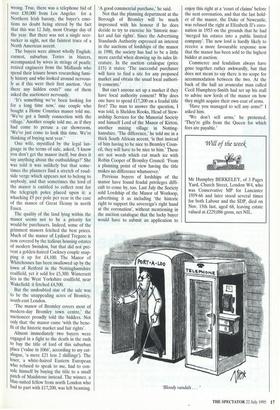ARMS AND THE MANOR
Ross Clark attends an auction of feudal titles,
and finds that the market in acquired respectability is not what it was
IF YOU talk to an estate agent he will tell you that we are a country ruined by falling blouse prices. But the prospects for houses look positively rosy compared with those for manors.
The trade in lordships of the manor, those archaic feudal titles whose once valuable rights have been rendered almost entirely meaningless by centuries of subse- quent legislation, began in earnest in the mid-1980s. At one of the first auctions, in London in December 1986, the title to the manor of Riseley, an elongated but largely unspoilt village in the wolds of northern Bedfordshire, was sold to a buyer in Switzerland for £10,000. Last week, at a sale held by an outfit called the Manorial Society in Stationers Hall, in the City of London, Riseley came up for sale again. This time it fetched £4,100.
'You'll find that all those lordships sold in the late Eighties were at vastly inflated prices,' a concerned lady from the Manori- al Society told me. 'We were holding three or four sales a year then. Now we're keep- ing it down to one or two.'
Even so, the society seems to have its work cut out preventing prices from slid- ing further still. One Japanese spectator at last week's sale had been sent along to the auction to check the prices: in January he had bought for a client, and now the client wanted to reassure himself he hadn't spent too much.
'He's going to do his nut when he sees these prices,' the Japanese told me in sur- prisingly demotic English. 'He paid 0,000 and look: most of these are going for L4,000.'
On this occasion the society had tried to stimulate flagging interest by including in the sale a couple of those well-known feudal privileges called personalised number plates, `MllORD' and `11411ADY', which, the cata- logue reminded buyers, nearly read as 'Milord' and 'Milady'. Auctioneer Robert Smith explained that the plates were recent- ly purchased by Earl and Countess Bradford 'as a family investment' and attached to his lordship's Jaguar and her ladyship's Rover. Alas, the plates found no takers, not even at £1,500, less than a third of the guide price. In addition two manors had to be withdrawn through lack of interest.
Half of the lordships failed to reach their guide prices; nevertheless, £4,000 — the typical price — is still a lot to pay for the honour of putting 'Lord of the Manor' on your passport, the one concrete benefit that seems to come with a purchase. So who, exactly, pays this kind of money? If you thought they are only Americans with more money than sense you would be wrong. True, there was a telephone bid of over £30,000 from Los Angeles for a Northern Irish barony, the buyer's emo- tions no doubt being stirred by the fact that this was 12 July, most Orange day of the year. But there was not a single seer- sucker in sight, not the faintest trace of a North American accent.
The buyers were almost wholly English: earnest, suburban Tories in blazers, accompanied by wives in strings of pearls; retired engineers from the Midlands who spend their leisure hours researching fami- ly history and who looked around nervous- ly as if this were their first auction. 'Are there any hidden costs?' one of them asked the auctioneer nervously.
It's something we've been looking for for a long time now,' one couple who bought a Home Counties manor told me.
'We've got a family connection with the village.' Another couple told me, as if they had come to peruse a car showroom, 'We've just come to look this time. We're thinking of buying next year.'
One wife, mystified by the legal lan- guage in the terms of sale, asked, 'I know you don't get the manor itself, but does it say anything about the outbuildings?' She was told it was unlikely but that some- times the planners find a stretch of road- side verge which appears not to belong to anybody, and that sometimes the lord of the manor is entitled to collect rent for the telegraph poles placed upon it: a whacking £9 per pole per year in the case of the manor of Great Henny in north Essex.
The quality of the land lying within the manor seems not to be a priority for would-be purchasers. Indeed, some of the grimmest manors fetched the best prices. Much of the manor of Lydiard Tregoze is now covered by the tedious housing estates of modem Swindon, but that did not pre- vent a golden-haired Cockney couple snap- ping it up for £4,100. The Manor of Whitehouses has been swallowed up by the town of Retford in the Nottinghamshire coalfield, yet it sold for £5,300. Wintersett lies in the West Yorkshire coalfield, near Wakefield: it fetched £4,500.
But the undoubted star of the sale was to be the unappealing acres of Bromley, south-east London.
'The manor of Bromley covers most of modern-day Bromley town centre,' the auctioneer proudly told the bidders. Not only that: the manor came 'with the bene- fit of the historic market and fair rights'.
Almost immediately two buyers were engaged in a fight to the death in the rush to buy the title of lord of this suburban place ('value in 1066', according to my cat- alogue, 'a mere £21 less 2 shillings'). The loser, a white-haired Eastern European Who refused to speak to me, had to con- sole himself by buying the title to a small patch of Maidstone instead. The winner, a blue-suited fellow from north London who had to part with £17,200, was left beaming. 'A good commercial purchase,' he said.
Not that the planning department at the Borough of Bromley will be much impressed with his honour if he does decide to try to exercise his 'historic mar- ket and fair rights'. Since the Advertising Standards Authority expressed an interest in the auctions of lordships of the manor in 1990, the society has had to be a little more careful when drawing up its sales lit- erature. In the auction catalogue (price £15) it states: 'The successful purchaser will have to find a site for any proposed market and obtain the usual local authori- ty consents.'
• But can't anyone set up a market if they have local authority consent? Why does one have to spend £17,200 on a feudal title first? The man to answer the question, I was told, is Sheldon Rooks, Head of Stew- ardship Services for the Manorial Society and himself Lord of the Manor of Kirton, another mining village in Notting- hamshire. 'The difference,' he told me in a thick South African accent, 'is that instead of him having to be nice to Bromley Coun- cil, they will have to be nice to him.' These are not words which cut much ice with Robin Cooper of Bromley Council: 'From a planning point of view having the title makes no difference whatsoever.'
Previous buyers of lordships of the manor have found feudal privileges diffi- cult to come by, too. Last July the Society sold Lordship of the Manor of Worksop, advertising it as including 'the historic right to support the sovereign's right hand at the coronation', without mentioning in the auction catalogue that the lucky buyer would have to submit an application to 'Bloody vandals . . . ' enjoy this right at a 'court of claims' before the next coronation, and that the last hold- er of the manor, the Duke of Newcastle, was refused the right at Elizabeth II's coro- nation in 1953 on the grounds that he had 'merged his estates into a public limited company'. The new lord is hardly likely to receive a more favourable response now that the manor has been sold to the highest bidder at auction.
Commerce and feudalism always have gone :together rather awkwardly, but that does not mean to say there is no scope for accommodation between the two. At the back of the hall an avuncular man called Cecil Humphrey-Smith had set up his stall to advise new lords of the manor on how they might acquire their own coat of arms.
'Have you managed to sell any arms?' I asked him.
'We don't sell arms,' he protested. 'They're gifts from the Queen for which fees are payable.'



















































 Previous page
Previous page